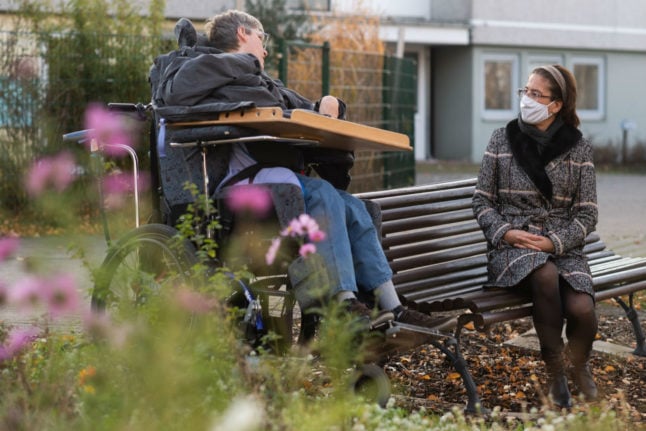Worries about health, financial hardship or simply boredom: the coronavirus pandemic is a burden for everyone. But people with learning disabilities are particularly hard hit by the restrictions.
“After the progress made in the effort to achieve inclusion, coronavirus almost means a step backwards,” says Ulrich Stoebe, director of the Diakonie Himmelsthür, which provides assistance to people with intellectual disabilities in Lower Saxony.
Stoebe said that some of the people in her organisation have developed excessive fears because of the pandemic reports they see on TV, which in some cases have resulted in aggression.
“Their everyday life was completely overthrown. The psychological strain is great, precisely because many cannot comprehend exactly what's going on,” said Stoebe.
Will people with disabilities be forgotten in the pandemic? In 2018, just under one million people in Germany received some form of disability assistance through organisations such as Diakonie.
They offer both residential care programmes and daily workshops which give the opportunitiy to pick up new skills – and receive employment through them.
READ ALSO: At last: Germany passes major disabled rights reform
Yet neither institutions nor the people affected are sufficiently taken into account in Germany's coronavirus aid draft laws, said the association Caritas Behindertenhilfe und Psychiatrie (CBP).
No coronavirus bonus is envisaged for staff at these institutions, for example, in the same way that nurses or carers have received extra aid or supplies.
“Many people with disabilities must also expect a serious course of illness if they become infected with Covid-19,” says Ulla Schmidt of the Social Democrats (SPD), former Health Minister and chairperson of the non-profit Lebenshilfe (Life Help).
Therefore, their carers must also be given the opportunity to be vaccinated as a priority, she added.
The International Day of People with Disabilities on Thursday December 3rd aims to draw attention to the rights of those affected.

A sign in Dresden on Wednesday in honour of the International Day of People with Disabilities reading, “Disability needs inclusion”. Photo: DPA
'The stress level is much higher'
During the first lockdown in the spring there was a ban on visiting homes and residential groups, and the workshops for people with learning disabilities were also closed.
A gradual opening began in June. Yet at Diakonie Himmelsthür’s headquarters in Hildesheim, for example, only 15 instead of the usual 30 women and men per group can attend at a time.
Furthermore, those at residential disability centres must always stay in the same group together – an arrangement similar to that seen in Germany's schools. But before coronavirus, this was precisely what they tried to avoid.
Now cabin fever has struck many. “They miss sports, shopping trips and even bus rides,” said Marianne Heller, department head. “The stress level is much higher.”
A hygiene plan has been developed for the 30 or so locations of Diakonie Himmelsthür in Lower Saxony. Every day, a balance has to be found between the need for independence and physical closeness and protection against infection.
Coronavirus outbreak
In May, there was a coronavirus outbreak in a residential group in Bad Salzdetfurth and 32 people became infected – a 46-year-old resident died after being ventilated in an intensive care unit.
After the first phase of the pandemic, the Psychological Service of the Diakonie, according to Stoebe, noticed deterioration in many people. Deprived of employment opportunities through daily workshops, they withdrew and lost skills they had learned.
During ban on visitation, however, many people picked up new hobbies such as crocheting or playing the guitar, said Stoebe.
Despite individual outbreaks, it is right to keep the social facilities open during the partial lockdown, said Christian Germing, who is involved in the association Caritas Behindertenhilfe und Psychiatrie (Caritas Disability Assistance and Psychiatry).
In his opinion, the distance and hygiene rules are well implemented in the workshops, meaning that shutting them down is not necessary.
“People with mental and especially psychological disabilities need a fixed daily structure. Some of them are even afraid of their holidays because then the structure would be lost,” said the head of the Caritas association for the Coesfeld district in the Münsterland region.
“The complete closure during the spring lockdown was also a great burden for the relatives.”
Sometimes parents over the age of 80 even took over the care of their adult children, who could no longer attend the workshops.
It remains to be seen what the ultimate effect of the pandemic will be, but it's clear that organisations are doing their best with the resources they have to support those with learning and sometimes physical disablities.



 Please whitelist us to continue reading.
Please whitelist us to continue reading.
Member comments